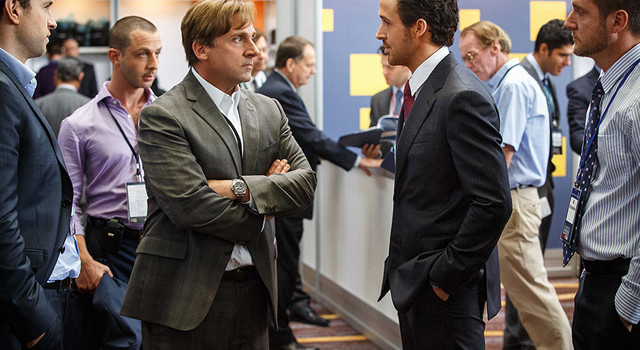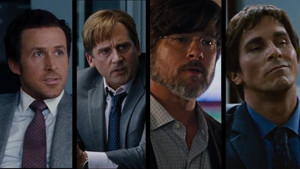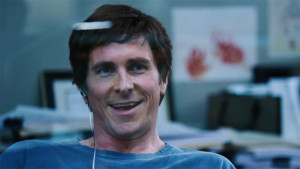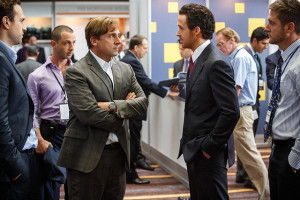As we learned from our Adam McKay interview for The Big Short, the film about the financial crisis that culminated in the 2008 near destruction of the U.S. economy was a perfect fit for the director known previously for helming comedies such as Anchorman and Step Brothers.
When we caught up with the cast of The Big Short, including Steve Carell, Ryan Gosling and Christian Bale, the echoed the sentiment that their helmer couldn’t have had more passion for the subject matter and bringing it to life for audiences in a way that was approachable, serious and yet still lighthearted.
Carell has known McKay the 80s. “He’s the same guy. He’s always been very passionate and really smart, incredibly funny. He’s just a weird, a smart, weird guy. He’s always the funniest person in the room, and he knows it. No, and he’s so shy about that, and very self-deprecating, but he is. You know, every time I’ve worked with him, he’s always the person with the most unique, the funniest idea, the idea that you wish that you’d had, and the one that when he gives it to you, you hope you don’t screw up in the presentation,” Carell said.
“I thought he was the perfect choice to do this. And when we first talked about the script, Adam said, ‘It is very dense. It’s very complicated material, but more than anything I want it to be entertaining, and it has to be entertaining.’ I thought the script reflected that. He’s sort of a dream director to work for and with, as an actor, because he allows you this enormous freedom to fail and to explore and you feel protected by him.”
For Ryan Gosling, it was also about McKay, but it was also the script and the compelling book by Lewis.
“I love Adam’s movies and in some ways they’re not even movies, they’re like friends of mine or something. Like, I’ll check in with Step Brothers just to see how it’s doing. You know, I love them, and so to be able to work with him at all was exciting, and then to get this script and to see that it’s sort of a departure for him and to be able to be a part of that as well just made it more exciting,” Gosling said.
Gosling found the filmmaking process of The Big Short an education, much like the viewer will had about a scandal that seems too hard to understand for many. “I learned a lot from the script and then obviously through Michael’s book, and then through the research process and even through watching the film, I’ve learned more. I think Adam has, especially in combination with Michael, their work, it’s very unique, this film,” the actor added.
What is so unique and so fascinating about the film (as you can see from our The Big Short review) is that the audience will be enlightened, entertained and yes, enraged at what these banker-criminals did to our economy. “Adam just has a way of maintaining his sense of humor about something that’s obviously very upsetting, and I think it’s very unique and a very exciting thing to be a part of.”
Bale had the unique situation of working alone most of the time. For the man who recently came off a huge franchise (Batman) that had him surrounded by hundreds at any given time, The Big Short was a chance to go in the opposite direction.
“I didn’t work with anybody. I met Steve for the first time last night. Ryan and I met before. And I really loved just working by myself. It was great. So much fun,” Bale said.
“It’s amazing how much you can get done when there’s nobody else. We shot for nine days and man, we just banged out the pages so quick and could just, like Steve was saying, play around with it so much. And when you’re by yourself there’s really no continuity that you got worry about. I loved it. I want to make every film that way from now on.
For Carell, the emotion of the film could be summed up in one cinematic moment. “I think the scene in which Brad’s (Pitt) character turns and says, ‘Don’t dance.’ I think that’s such a crystalizing moment, because that to me is the entire movie boiled down to just one small seemingly inconsequential moment — don’t dance,” Carell said.
The characters, these men the cast play who discovered that the financial crisis was coming, and managed to make money off of it, could have celebrated their victory, but as Pitt’s character emphasizes, millions will be affected. They unearthed a problem and brought it to the attention of the government, but it was not something to celebrate.
“The way he delivers that as well. I mean, it’s so heartfelt and so human,” Carell said. “He’s so connected to the tragedy behind all of this. There is an enormous conflict I think going on within all of these characters.”




